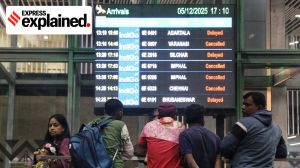RAW, IB pass the buck: Moily
Administrative Reforms Committee chairman Veerappa Moily talks to The Indian Express about the recent Mumbai terror attack...

Administrative Reforms Committee chairman Veerappa Moily talks to The Indian Express about the recent Mumbai terror attack, about police reforms, intelligence failure and poor inter-agency communication.
•In the wake of the Mumbai terror attacks and the number of serial blasts all across the country in the past one year, what is your evaluation of the intelligence gathering in the country?
All intelligence agencies, whether it’s the Research and Analysis Wing (R&AW) or the Intelligence Bureau (IB) or the state intelligence bureaus, seem to be working in isolation. There is no convergence of intelligence or information at any level. After each terror attack, each agency passes the buck to other when questioned about intelligence failure.
•You mean after every attack, there are intelligence reports that the state had prior information, but failed to act upon it.
Yes. There are always intelligence reports, whether from the R&AW or the IB, about possible terror strikes or conflicts, but the state governments claim the information is not clear and seldom take action. There is no procedure to properly analyse the intelligence received, formulate a plan and act on it immediately.
•Is there no intelligence convergence?
Exactly. Information comes in from several agencies, but there is no proper networking between the Central intelligence agencies, the state agencies and the police agencies. Also, the state police as well as the actual implementing agencies are badly in need of reforms and technological upgradation.
•What is the situation of the state intelligence agencies?
They are absolutely unprofessional. It is no secret that police officers, who the state government does not approve of, are dumped into the state intelligence bureau as punishment posting. The state intelligence bureau is usually looking into what the opposition parties are up to and where there are internal conflicts. This has to change.
•So it comes back to the implementation of police reforms…
State governments, whether the Congress ruled or otherwise, have shown some strange aversion to implementing police reforms since beginning. The Supreme Court has given them many deadlines, but there’s no visible implementation as yet.
•What do the reforms include?
For example, the compartmentalisation of the police force. Now, there is no clear idea about which arm of the police does what. Investigation, traffic, law and order and intelligence have to be segregated and the police should have complete autonomy. Once the reforms are implemented, the chief minister cannot randomly transfer officers and control tenure. The state will not even appoint the director general of police.
•Is tenure an important factor?
Yes. In this day and age, domain expertise and professionalism are of prime importance. The upper echelons of the police department cannot possibly do this if they handle a different department or region every six months.
•Does this also apply to intelligence agencies?
We have IB officers from IPS cadre, but only for a certain period of time. There have to be procedures where such officers are recruited into Central agencies and made to stay for a while to develop domain expertise.
•What about technology? Are the police capable of tackling terror with the kind of equipment they have at present?
Upgrading technology is also included in police reforms. The police cannot be expected to fight terrorists with lathis and pistols. They will soon be given technical training to tackle such situations better. But again there must be pressure on state governments to implement these reforms at the earliest possible. They should be held accountable for delaying it.
•Is the IB good enough to gather intelligence?
The IB is a good agency, but it is definitely not enough. We have also proposed an internal security council to collect, analyse and keep track of intelligence.
•How soon can the police reforms be implemented?
It’s all available like a capsule to the states to implement immediately. Eighty per cent can be implemented by the executive, another 15 per cent through legislations and the rest five per cent through Constitutional amendments.
- 01
- 02
- 03
- 04
- 05































